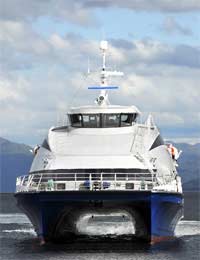The Lowdown on UK Ferry Travel

At one time ferries connected millions of British holidaymaker's with a host of European countries, but as former ferry hub Newcastle is forced to sever its historic links with Scandinavia, are we finally waving farewell to the UK ferry industry?
Dark Days for UK Ferry Travel
Until recently ferries were responsible for connecting UK islanders with many of their European neighbours – Ireland, Denmark, Germany, France, Belgium, the Netherlands, Spain, Sweden and Norway. But as the UK ferry industry struggles with ailing health, such links with the mainland are fast disappearing; 2005 saw the closure of the Harwich – Cuxhaven ferry route, the last such remaining link with Germany, and 2008 saw Scotland’s final ferry link with the Europe mainland disappear for good.Over the last decade the once vibrant shipping hub of Newcastle-upon-Tyne has been forced to sever its North Sea ferry links one by one. 2008 saw the final ship sail eastwards to Scandinavia, when the Bergen, Norway ferry left port on September 1st. At one time you could sail from Newcastle to Oslo, Haugesund, Kristiansand, Gotherburg, Hamburg, Esbjerg, Ijmuiden as well as Bergen. Now the only ferry route remaining is that to Amsterdam, and even the future of that remains in doubt.
Although the southern part of the UK may have benefited hugely from the superb Eurostar connection – particularly with the opening of the high speed rail link from London St Pancras in 2007 – it seems Scotland and the north of England are more becoming more adrift from the continent than ever.
The Damage of Ferry Travel
The popularity of low-cost airlines, rising fuel prices, the end of duty-free sales and the opening of the Channel Tunnel have each done their bit to give the UK ferry industry a serious battering. Countless route closures, massive job cuts; the effects have been a regular news item for over a decade.Serious problems for the ferry companies began in 1994 with the opening of the Channel Tunnel, and were further compounded by firstly the axing of duty free sales in the late 90s, and then, perhaps more significantly, the rise of budget airlines. Suddenly more holidaymakers were opting for a speedy flight to a Spanish beach resort over leisurely ferrying their caravan across to French pastures. The slow roll of the ferry is perhaps just too impractical in the hurried mindset of the modern world.
The Slow Beauty of Sailing
Unfortunately so much is lost with this modern predilection for jetting blindly into a foreign destination; the human sense of distance travelled, the adventure of journeying across foreign lands and also the slow relaxing pleasures of travel. Flying is a chore that bookends the period of fun and relaxation, whereas a ferry journey is an important part of the holiday itself.Arriving in a city by water has been the natural route of travellers for centuries – whether it’s down the Elbe to Hamburg or up the fjord to Bergen – watching your destination slowly approaching over the horizon certainly beats being dumped unceremoniously in its airport in the outskirts.
Whether it’s the white cliffs of Dover, or the Statue of Liberty, a lot of national symbols are emblematic because they are the first things that capture the eyes of immigrants arriving into the country by sea. The first thing first time visitors to England are now likely to see is the soulless sprawl of Heathrow airport.


Re: Getting a Boating Licence
Hi, Could you please help? I'm looking to go to Germany, with my partner, to spend a long weekend, cruising along a few…
Re: The History of the Channel Ferry
Hi Can anyone help, please? In December 1945 how would a person travel from Dover to Callais? The date is Key. Ferry?…
Re: The History of the Channel Ferry
Hi Can anyone help, please? In December 1945 how would a person travel from Dover to Callais? The date is Key. Ferry?…
Re: The History of the Channel Ferry
I didn’t realise this was going out as a general request for information. But if anyone out there can help me or point me in…
Re: The History of the Channel Ferry
Do you have any information on the ferries that operated between Harwich and the Belgian coast during the late 1920s / early…
Re: Getting a Boating Licence
I’m need a license for a 14 ft 5 bh for a pleasure and fishing in the Thames ? I’m used just in the weekend and I’m taking home
Re: Getting a Boating Licence
Hi pls help with few questioned I have. I bought a fletcher arrow speed boat for sole use on our lovely British coastline for some…
Re: Getting a Boating Licence
I’m buying an 8 metre yacht to live in at a dock and going to sail around the uk sea do I need a license
Re: Getting a Boating Licence
I want to learn how to drive a boat do I need some form of provisional? Do I need to do a test etc before hiring a boat out etc
Re: Getting a Boating Licence
Can anyone help at all I just don't know where to start. My self an the kids have decided to buy a rib inflatable boat what do I need…